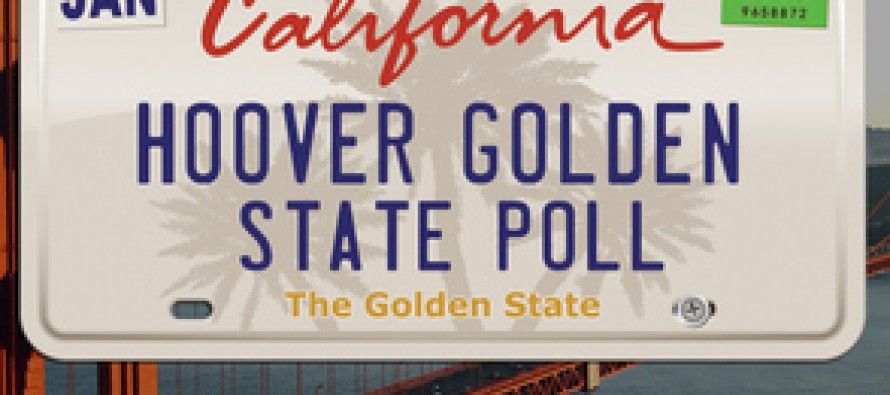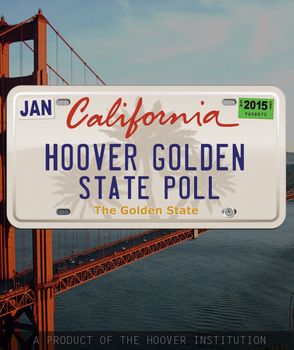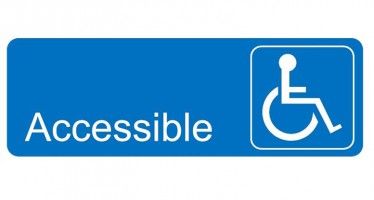Hoover Poll: CA wants growth, not green programs or rail

 Gov. Jerry Brown just won a resounding re-election victory. But his new budget released last week for Fiscal Year 2015-16, which begins on July 1, is out of sync with Californians on some important issues, according to the Hoover Institution’s new Golden State Poll. It questioned people between Dec. 9 and Jan. 4.
Gov. Jerry Brown just won a resounding re-election victory. But his new budget released last week for Fiscal Year 2015-16, which begins on July 1, is out of sync with Californians on some important issues, according to the Hoover Institution’s new Golden State Poll. It questioned people between Dec. 9 and Jan. 4.
The poll’s findings are consistent no matter political party, income or education level, race, gender, ideology or interest in following the news.
The overwhelming voice of California likely voters seeks:
- Economic growth: 72 percent
- Solving the state’s drought and other water problems: 69 percent
- Improving jobs: 66 percent
- Balancing the state budget: 61 percent
Much lower down on the list are some of Brown’s top priorities:
- Dealing with the environment: 32 percent
- Global warming: 26 percent
- Making public pensions sound: 26 percent
- Strengthening gun laws: 26 percent
- Continuing the state’s high-speed rail project: 16 percent
(See table below for a full list.)
Brown’s budget proposal runs against the grain of public opinion by:
- Spending $532 million of the new $7.5 billion Water Bond from Proposition 1 that will do nothing directly to deal with drought (poll respondents had a 69 percent priority to deal with the drought).
- Moving ahead with the bullet-train project (only 16 percent priority) with $250 million of funding from the California Air Resources Board’s cap-and-trade tax on industries and public utilities (only 26 percent priority).
- Doing nothing to reduce the state’s $15 billion duplicative and ineffective energy efficiency and renewable energy programs per the California Legislative Office report of December 19, 2012 (only 40 percent priority).
- Funding a school facilities bond that caters to special interests (54 percent priority against special-interest funding).
- Including $1.4 billion for teacher pension funding (only 34 percent priority).
Pensions
High responses (65 percent or higher) and low responses (35 percent or lower) are both strong indicators of what Californians want to be emphasized in the state budget and other policies. Conversely, modest responses (40 to 60 percent) are not strong indicators one way or another.
Viewed in that frame, the Hoover Poll indicates Californians want economic growth, jobs and a concrete solution to the state’s perpetual drought problems.
Conversely, they consider it a low priority to make pensions sound, reduce income inequality, protect the environment, deal with global warming or proceed with the high-speed rail. In fact, the rail project received the lowest priority of all by far: just 16 percent.
That means 84 percent of Californians are not enthusiastic about the project. Yet Brown has branded rail opponents “dystopians and declinists.”
Californians have modest and equivocal responses to improving roads, K-12 education, reforming the tax system, reducing crime, dealing with energy problems, helping the needy and reducing Medi-Cal costs.
One anomaly is over public pensions. Despite low public awareness, this is a $500 billion problem that just can’t go away. Even the bankrupt cities of Vallejo, San Bernardino and Stockton have been forced to fund pensions above all other priorities. Doing so has brought both large budget cuts to essential services and tax increases.
Legislature unlikely to rectify budget priorities
The voters’ voice is clear from the Hoover poll: Californians want economic growth, private sector jobs and a real solution to the drought problem.
However, it is unlikely the Legislature is going to rectify the budget to be more in line with voters’ priorities given that only 34 percent of those polled by Hoover had any trust in state government.
A mismatch between voter desires and government action is a recipe for political dysfunction.
Top Priorities for California’s State Government – Most Likely Voters
| Question: In his State of the State speech, Governor Brown will talk about what he thinks should be priorities for California’s state government in 2015. Thinking about the issues facing California, what do you think should be a top priority, important but lower priority, not too important or should not be done? | |
| Percent saying each is a “top priority” | Total |
| Strengthening the state’s economy | 72% |
| Dealing with the state’s water problems | 69% |
| Improving the job situation | 66% |
| Balancing the state’s budget | 61% |
| Reducing influence of special interests on state government | 54% |
| Dealing with the issue of illegal immigration | 49% |
| Improving state’s roads, bridges and public transportation | 47% |
| Improving the K-12 education system | 46% |
| Reforming the state’s tax system | 45% |
| Reducing crime | 44% |
| Dealing with state’s energy problems | 40% |
| Helping the poor and needy people | 37% |
| Reducing the costs for Medi-Cal program | 36% |
| Make public employee pensions fiscally sound | 34% |
| Protecting the environment | 32% |
| Reducing income inequality | 29% |
| Reforming the state’s pension system | 26% |
| Dealing with global warming | 26% |
| Strengthening gun laws | 26% |
| Continuing the state’s high speed rail project | 16% |
| Data Source: Hoover Institution Golden State Poll, Dec. 9, 2014 to Jan. 4, 2015 | |
Related Articles
NFIB backs four business reform bills
Here’s the analysis of four bills in the California Legislature by the National Federation of Independent Business California. The NFIB
CA, feds struggle with — and spar over — pot regulation
As California muddles ahead with its disorganized decriminalization of marijuana, local and federal lawmakers are adopting distinctly different approaches to
Guarded Optimism For CA Military
FEB. 16, 2012 By KATY GRIMES It could have been an episode of “The General, His Wife, The Staff, and




